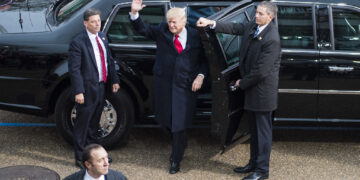FOR IMMEDIATE RELEASE:
May 9, 2023
Contact: press@defensepriorities.org
WASHINGTON, DC—Yesterday, following a meeting in Beijing with U.S. Ambassador Nicholas Burns, Chinese Foreign Minister Qin Gang stressed the need for the U.S. and China to stabilize relations. This was the first time the two have met since the balloon incident in February. Defense Priorities Director of Asia Engagement Lyle Goldstein issued the following statement in response:
“A meeting between U.S. Ambassador to China Nicholas Burns and Chinese Foreign Minister Qin Gang should be routine—that it’s not reflects the unfortunate state of this critical bilateral relationship. An excessively hostile posture toward Beijing, and an assumption that some kind of cold, or even hot, war is unavoidable, has taken hold of Washington’s approach to the Asia-Pacific region, which is bad for both U.S. national security and our country’s economic interests. Both demand a pragmatic working relationship between the world’s two most powerful countries.
“The last meeting between the American and Chinese heads of state took place for just a few hours in Bali about six months ago, but such brief discussions are woefully inadequate. The Biden Administration should give U.S.-China relations the focus and resources it deserves. At a minimum, there should be an annual presidential summit, but this should be accompanied by continuous engagement by the national security establishment, and particularly by America’s chief diplomats. The two sides are certain to disagree on many or even most points, yet the imperative is to seek points of agreement to safeguard American prosperity and, more urgently, to prevent an armed showdown that could entail immeasurable destruction.
“Responsible competition with China would clearly define U.S. vital interests, the challenges and threats China might pose to them, and specific courses of action to advance our national priorities. An ill-defined antagonism is the opposite of strategy, and a reactionary policy that seeks to oppose anything and everything Beijing does risks U.S. exhaustion—and a collision with China, which is in neither country’s interest.”
Author

Lyle
Goldstein
Director, Asia Program
More on Asia

By Peter Harris
December 20, 2024

December 17, 2024

Featuring Lyle Goldstein
December 15, 2024
Featuring Jennifer Kavanagh
December 11, 2024

December 5, 2024



